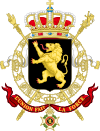
The politics of Belgium take place in the framework of a federal, representative democratic, constitutional monarchy. The King of the Belgians is the head of state, and the prime minister of Belgium is the head of government, in a multi-party system. Executive power is exercised by the government. Federal legislative power is vested in both the government and the two chambers of parliament, the Senate and the Chamber of Representatives. The federation is made up of (language-based) communities and (territorial) regions. Philippe is the seventh and current King of the Belgians, having ascended the throne on 21 July 2013.

Belgium is a federal state comprising three communities and three regions that are based on four language areas. For each of these subdivision types, the subdivisions together make up the entire country; in other words, the types overlap.

The German-speaking Community, also known as East Belgium, is one of the three federal communities of Belgium, with an area of 854 km2 (330 sq mi) in the Liège Province of Wallonia, including nine of the eleven municipalities of Eupen-Malmedy. The primary language of the community is German, making this one of the three official languages in Belgium. Traditionally the community and the wider area around it forms an intersection of various local languages and/or dialects, namely Limburgish, Ripuarian and Moselle Franconian varieties. The community population numbers around 79,000 – about 7.0% of Liège Province and about 0.7% of the national total.

Vivant is a small social-liberal political party in Belgium founded by millionaire Roland Duchâtelet. In the regional elections in June 2004, the party formed a strategic alliance with the Flemish Liberals and Democrats (VLD). Both parties are founded on the principle of individualism and can be called liberal. In 2007, the party announced it would likely merge with the VLD.
On 13 June 2004, regional elections were held in Belgium, to choose representatives in the regional councils of the Flemish Parliament, the Walloon Parliament, the Brussels Parliament and the German-speaking Community of Belgium. The elections were held on the same day as the European elections.

The Socialist Party is a social democratic French-speaking political party in Belgium. As of the 2024 elections, it is the fourth largest party in the Belgian Chamber of Representatives and the second largest Francophone party. The party is led by Paul Magnette. The party supplies the Minister-president of the French Community, and the Brussels-Capital Region. In the German-speaking community, the party is known as the Sozialistische Partei (SP).

The Federal Parliament is the bicameral parliament of Belgium. It consists of the Chamber of Representatives and the Senate. It sits in the Palace of the Nation in the centre of the nation's capital, Brussels.

ProDG is a regionalist, Christian-democratic political party active in the German-speaking Community of Belgium. The party brings together politicians from the previous Party of German-speaking Belgians (PDB) and Parteilos Jugendliche Unabhängige (PJU) movement. The party was formed in 2008 and first featured on the electoral ballot in 2009. Following the 2009 regional election, the party won four out of 25 seats in the Parliament and participated in the regional Government of the German-speaking Community of Belgium with two ministers. In the 2014 regional election, the party won six seats and its leader Oliver Paasch became the new minister-president.

Elections in Belgium are organised for legislative bodies only, and not for executive functions. Direct elections take place for the European Parliament, the Chamber of Representatives, the Parliaments of the Regions, the Parliaments of the Communities, the provincial councils, the municipal councils and the councils of Districts of Antwerp. Voting is mandatory in federal elections, and all elections use proportional representation which in general requires coalition governments.

The government of the Brussels-Capital Region is the political administration of the Brussels Capital Region of Belgium. An election is held every five years. The government is headed by a Minister-President, four ministers and three state secretaries.
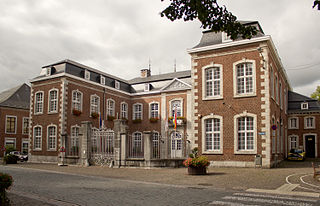
The government of the German-speaking Community is the executive body of the German-speaking Community of Belgium, located in the east of the province of Liège. The members are chosen by the Parliament of the German-speaking Community.
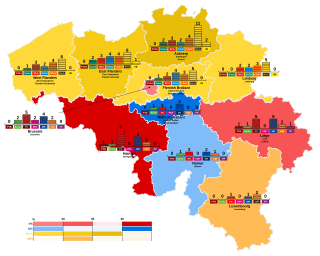
Federal elections were held in Belgium on 25 May 2014. All 150 members of the Chamber of Representatives were elected, whereas the Senate was no longer directly elected following the 2011–2012 state reform. These were the first elections held under King Philippe's reign.
Regional elections were held in Belgium on 25 May 2014 to choose representatives for the Flemish Parliament, Walloon Parliament, Brussels Parliament and the Parliament of the German-speaking Community. These elections were held on the same day as the 2014 European elections as well as the 2014 Belgian federal election.
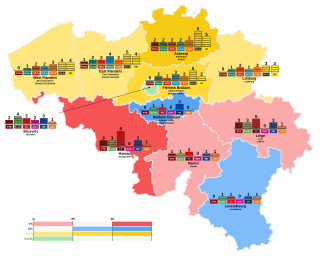
Federal elections were held in Belgium on 26 May 2019, alongside the country's European and regional elections. All 150 members of the Chamber of Representatives were elected from eleven multi-member constituencies.
Renate Haußleiter-Malluche, originally from Breslau, began her professional career as a German pediatrician, becoming after 1945 a politician in Bavaria

The 2019 Belgian regional elections took place on Sunday 26 May, the same day as the 2019 European Parliament election as well as the Belgian federal election.
Joseph Maraite was a Belgian politician of the German-speaking Community.
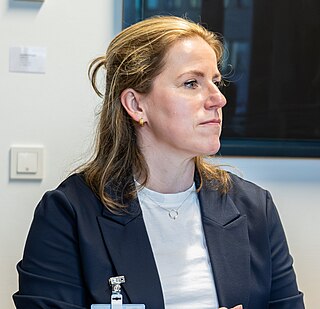
Isabelle Weykmans is a Belgian politician of the Partei für Freiheit und Fortschritt (PFF). She has been Minister in the Government of the German-speaking Community since 2004 and is currently responsible for the areas of culture, employment and tourism.

















